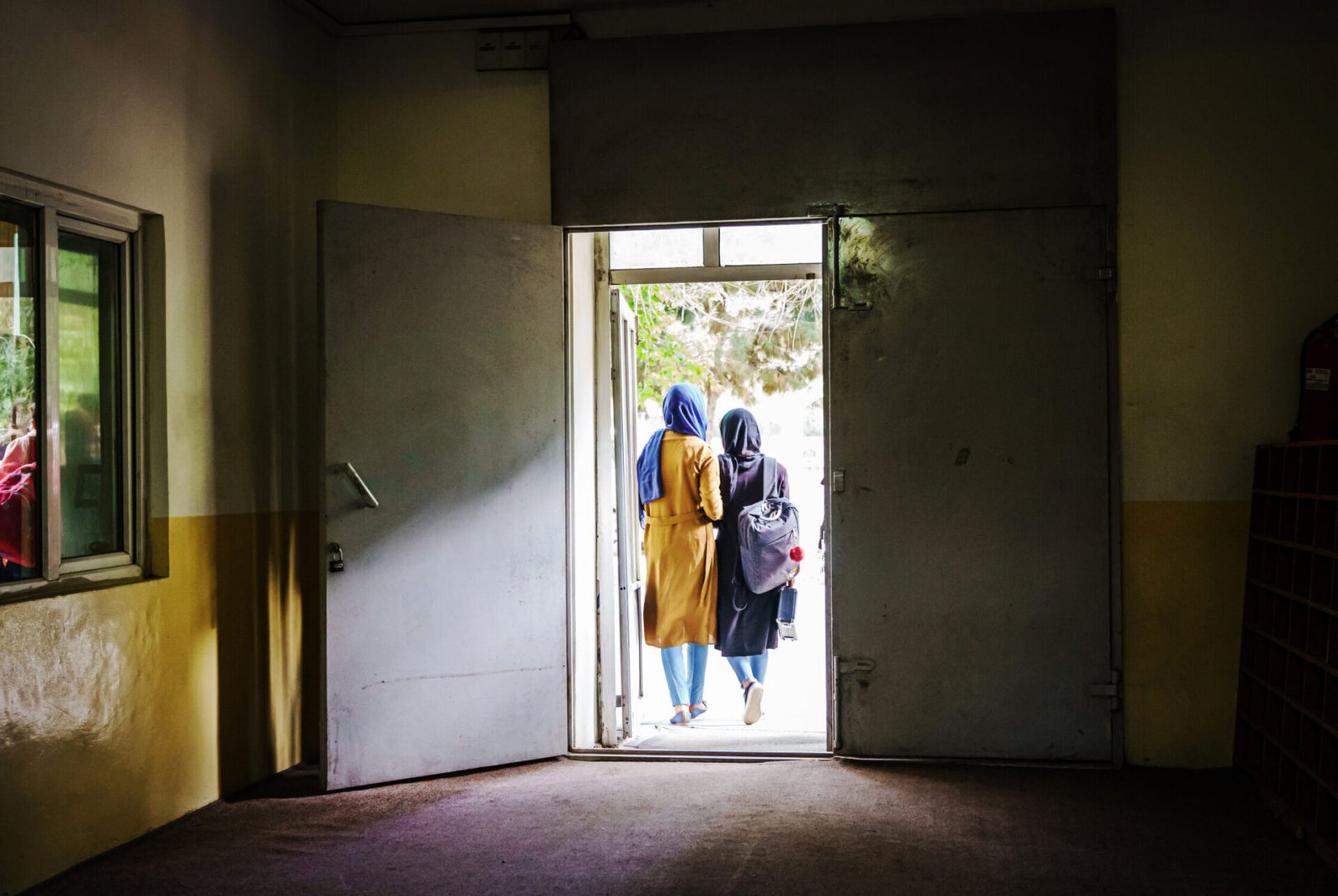Some dreams are quietly stolen before they even take flight.
Neelofar grew up in Mazar-i-Sharif, Afghanistan, amid the laughter of children and the hum of bustling markets. Women moved freely through the streets. Her mother worked in an office. And Neelofar, like many children, attended school with big dreams.
“We had hope that education could take us somewhere,” she said.
Her family’s lifeline stretched across continents. An uncle settled in the United States had long supported them. He helped thirteen of their relatives survive and dream of a better future. His support offered a fragile sense of security, even as the shadow of the Taliban grew longer over Afghanistan.
Under Taliban Rule
The first blow came when the Taliban returned to power. Schools closed for girls and Neelofar’s world contracted overnight.
“The first time I realized things would never be the same was when the school closed its doors to girls. We felt helpless. We cried. I felt my world shrink overnight,” she recalled.
For her, school had been more than a classroom. It was a space where she imagined her voice could matter.
Driven by her passion to learn and help others educate, she transformed her home into a makeshift academy for younger students.
“I wanted to help people (most of them were girls) learn,” she explained.
But even this quiet act of defiance drew threats from Taliban. “They gave us a notice that if you teach girls in your house, we will take those girls with us.” This forced her to shut the academy down.
Meanwhile, boys continued their studies under strict religious oversight. “They teach only rigid religious content, there is no real professional or academic training,” Neelofar noted.
Everyday life became a landscape of danger. “The Taliban were so strict that they could take women to jail for almost no reason,” she recalled, remembering a girl arrested over a minor dress code violation.
Jobs were scarce, wages were low, and the informal economy was unstable due to which men could not even earn good enough to support their families. “Everyone wants to leave Afghanistan just because of the Taliban and for peace. It’s not only hard for girls, but for men as well,” she reflected. In this environment, even breathing felt policed.
Women could not raise their voices in public. Even in prisons, she noticed that there were often more women than men.
Many were jailed for minor infractions of dress or movement rules. Women in Afghanistan were completely stripped of their rights. Those demanding jobs or freedom risked being taken from their homes and jailed.
“They make their videos and threaten them to leak their videos,” Neelofar explained, describing how women were coerced and humiliated. She further told us that there are no open organizations or movements that exist in Afghanistan which can offer protection.
“There was an incident,” Neelofar recounted, “my friend told me they made a lame excuse and took a girl away for not wearing socks. Some girls even disappeared during Eid, and no one dared speak out because the Taliban threatened families to stay silent and not talk to the media.”
Men were not exempt from oppression. Neelofar recounted an interview with a man who wore a mask to hide his identity. “The Taliban has done so bad to me,” he said. Once, he had worked with the Taliban, believing they had changed and were educated. Over time, however, they stripped him naked, warned him to stay silent, and forbade contact with the media. His family still remains in Afghanistan because his son is imprisoned under Taliban control.
Alternative Learning and Survival
With formal education denied to them, Afghan girls sought alternative ways to learn and earn. Beauty salons, tailoring centers, and handicraft workshops became classrooms of survival.
Online courses offered a glimmer of possibility, though poor and expensive internet access along with limited guidance kept them from fully blossoming.
“After schools closed, many families felt, ‘What’s the point of studying their daughters? They’ll just get married,” Neelofar explained. They lost motivation and families stopped thinking about the future of women.
Yet hope endured as an act of quiet courage.
“Hope is dangerous, but it is the only thing that keeps us moving forward,” she said.
Displacement to Pakistan
Faced with shrinking freedoms, Neelofar’s uncle advised her family to leave Afghanistan as soon as possible. Finally, Neelofar’s family made the difficult decision to leave Afghanistan. They moved to Islamabad, Pakistan, in 2021 with the hope that she and her siblings could resume their education.
Life offered her relative safety here. However, after seven months, news of girls’ schools reopening in Mazar-i-Sharif prompted a return to Afghanistan.
For about nine months, Neelofar attended classes again. At first, restrictions seemed lighter. It was perhaps to project a moderate image of Taliban internationally. But closures soon resumed. Girls’ schools shut, women could not leave home alone, and punishments for minor violations became common. Daily life grew increasingly harsh. Women could not go out unaccompanied and even small dress code violations could lead to imprisonment.
By 2023, fearing for their safety and education, Neelofar’s family returned to Pakistan. Pakistan offered a fragile refuge. Neelofar continued her studies and her siblings attended school. She stated “People in Pakistan are generally friendly, welcoming, and respectful toward us (Afghan refugees). They treat us like guests”.
Still challenges were immediate and constant like jobs were scarce for Afghans, language barriers made integration difficult, and legal status remained precarious.
But Pakistan still allowed more freedom, at least in daily interactions and basic activities.
However, in recent months, life has grown even more precarious. Visa extensions were delayed. Visa extensions cost around 20,000 rupees per person and bribes were sometimes demanded to avoid harassment or deportation.
“Even if your visa is ready, they treat you like a criminal and demand money,” Nilofer recalled. She described “I have seen people being asked for amounts like one lakh or even 2.5 lakh rupees. Any Afghan can be stopped and tortured just for documentation. The police demand visa, passport, and police registration, and sometimes even follow us in private cars, threatening to jail us if we don’t pay. The truth is, the police just want money.”
She further told “We are sometimes forced to go to Afghanistan to extend visas, but the situation has worsened. Now, visas can be cancelled, and even paying 10,000 rupees does not guarantee an exit permit. Everything is being postponed, making it very hard to stay and live safely in Pakistan.”
Hope, Resistance, and Aspirations
Now, Neelofar is preparing to move to Canada, seeking a place where her education, ambitions, and identity can truly flourish. Her uncle in the United States has been a steady anchor, guiding her through the complex journey of migration.
“Family networks are vital lifelines across borders,” she emphasized.
Her story reveals the intersection of gender, citizenship, and recognition. In Afghanistan, she faced punishment simply for being a woman; in Pakistan, for being Afghan.
“Never fully seen, never fully accepted,” she reflected.
For Neelofar, persecution was never a single dramatic event but a gradual tightening of restrictions around every aspect of life. “Not everyone can leave. Not everyone gets the opportunity. Many families decided to go, but that is also not a solution. The US or Canada cannot accommodate everyone, and it requires a lot of money,” she said, acknowledging her financial privilege.
She noted that most people did not have the same options. Those applying for Iranian visas faced threats of imprisonment from the Taliban.
Her story illuminates the broader consequences of systemic oppression. Gender apartheid is not only political or legal but it erases potential, isolates communities, and silences voices. Yet every act of endurance is also resistance.
Between borders and belonging, fear and courage, Neelofar’s life reflects the resilience of those who refuse to be invisible – a testimony not only to Afghanistan’s crises but to the universal human yearning for identity, dignity, and home.
“If hope demands leaving every space one calls home, what does it mean to truly have a home?” she asked, leaving the question lingering like a whisper to every reader.

Noor ul Sabah
Noor ul Sabah is a feminist researcher focused on intersectional approaches to gender, technology, and governance. Her work explores how power and identity shape experiences of violence, migration, and citizenship.



